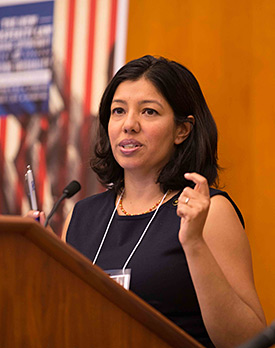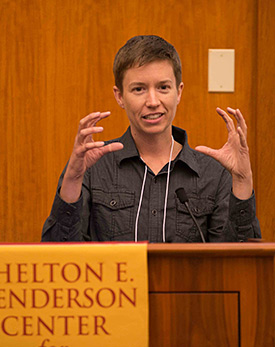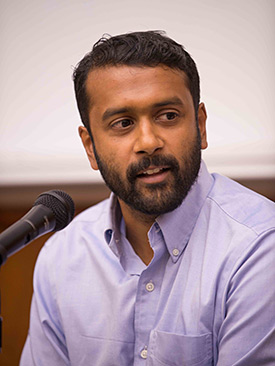By Andrew Cohen

of the Henderson
Center for Social Justice
At a recent Berkeley Law symposium marking the 50th anniversary of the War on Poverty, panelists called for a renewed and coordinated push to help low-income Americans.
Presented by the Thelton E. Henderson Center for Social Justice, the two-day event explored how lawyers and legal institutions can combat poverty—at the roots—by forging a more cohesive, media-savvy approach. With public concern about wealth distribution at a new high, participants said the time is ripe to make headway. “It’s a bright moment for this conversation,” said Dimple Abichandani, the center’s executive director. “Coming out of the recession, there’s been a clear shift in the awareness of poverty.”
Alan Jenkins demonstrated that awareness during the annual Olmos Law & Cultural Diversity Memorial Lecture, the symposium’s keynote address. The executive director of the Opportunity Agenda, which media-trained about 800 social justice leaders last year, Jenkins showed how lawyers eager to confront income inequality are entering the profession at an opportune time.
An annual poll shows that 50 percent of Americans believe poverty is caused by conditions beyond one’s control, the highest total since the poll’s inception in 1965. About two-thirds say reducing poverty should be a high government priority, and 64 percent of independents say society would improve if wealth distribution was more equal—higher than even Democrats (60 percent).
While Jenkins noted that Americans “generally think of poverty as a black problem,” the data shows otherwise: the nation’s poor are 42 percent white, 29 percent Latino, and 25 percent black. He played a 1964 presidential campaign ad for Lyndon Johnson—who launched the War on Poverty—which asserted that “poverty is not a trait of character.”

of the Sustainable
Economies Law Center
“This ad shows the power of storytelling, and that storytelling is something today’s social justice advocates must do better,” Jenkins said. “We’re talking about problem after problem, and not articulating a workable plan for change. Too often those of us working for the same goal aren’t working together, but in silos.”
Jenkins called for media strategies that reflect the decline of traditional journalism and investigative reporting. He framed 20th-century social movements as leader-oriented, hierarchical, linked to NGOs, and organized in person. By contrast, he said modern social movements have few recognized leaders and are non-hierarchical, less reliant on NGOs, and organized digitally. “If we can’t connect these movements and tap into these new methodologies, we’re going to lose,” Jenkins said.
Pathways to progress
Later in the symposium, East Bay Community Law Center (EBCLC) Executive Director Tirien Steinbach ’99 moderated a panel on the role of lawyers in combating poverty. Janelle Orsi ’07, executive director of the Sustainable Economies Law Center, discussed her work helping to launch enterprises such as food co-ops that create production and circulate it within their communities. Noting that 93 percent of the nation’s wealth is controlled by 20 percent of its people, Orsi urged law students to “reimagine the way lawyers practice law.”
Purvi Shah ’06 of the Center for Constitutional Rights exhorted attendees to look at law “from a movement-based perspective.” She came to the symposium from Ferguson, Missouri—where tense protests of police practices continue since the Aug. 9 shooting death of black teen Michael Brown—and was soon heading back. “Change happens not from cases, but from mobilizing people to push for change,” Shah said. “You have to run to the fire, to who’s the most oppressed, and provide help.”

Green-Collar
Communities Clinic
Adjunct Professor Mary Louise Frampton led a panel that blended seasoned social justice lawyers and recent Berkeley Law graduates. Hailing the virtues of “being a risk-taker in a risk-averse profession,” she praised the younger generation’s emphasis on cohesive messaging and coalition building. Panelists Sushil Jacob ’11, Daniela Urban ’12, and Katherine Katcher ’13 discussed the challenges of confronting wealth inequality early in their careers.
“You feel restless because you’re not seeing change happen as fast as you’d like,” said Jacob, the director of EBCLC’s Green-Collar Communities Clinic, which helps low-income entrepreneurs build locally-owned, environmentally sound businesses. “I’ve learned that the entities we work with need business training and education, not just legal counsel.”
Katcher founded Root & Rebound, which strives to lower barriers for former prisoners re-entering the work force. Urban, founder and executive director of the Center for Workers’ Rights in Sacramento, described the rewards of taking entrepreneurial risks as a young lawyer.
“The beauty of law school is that you can work at so many places in a short period of time,” she said of Berkeley Law’s many experiential opportunities. “I’m stealing great ideas from those experiences all the time while trying to help our workers. I also get to decide what I do and how I do it.”